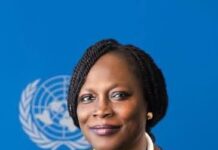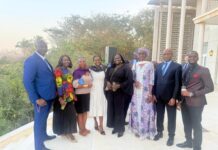
By: Foday Manneh
A side event on the margins of the 73rd African Commission on Human and People’s Rights session, the Open Society Foundation has convened a day-long conference on deepening people-centered democracy, accountable governance, and inclusive development in Africa.
The event, held in Banjul, The Gambia, brings together African human rights activists and civil society organizations.
The conference discusses issues from the impact of the Covid-19 pandemic on the governance system and human rights pressure from existing conflicts, violent extremism, organized crime, and climate-related security risks within Africa.
On Mali’s current political climate and governance system, human rights experts say seventy-six percent (76%) of the Malian population is not satisfied with democracy, and sixty-two percent (62%) trust little or not at all the courts of law.
The conference deliberated on the recent military coups returning to political instabilities in the African continent.
The Director of Policy and Engagement, Open Society Africa, George Kegoro, highlighted some of the reasons subjected to coups saying it is not the solution but primarily due to the people’s dissatisfaction towards the governance system.
“People need human security, which discusses everything to make life bearable, such as security for hunger, physicality, and social protection. If these lacks, that leads to a response which brings about coups.” George said.
According to records, the incidence of coups declined from the fifteenth (15) between the decade 1991 to 2000 to eight (8) in the decade after and five (5) between 2011 and 2020.
However, recent overthrows reported an accumulated five (5) military regimes in West, Central, and Eastern Africa within twenty-four (24) months. This, they say, is alarming, and the political instability has impacted the overall peace and security of the respective regions.
The Executive Director of the African Center for Democracy and Human Rights, Hannah Foster, said the conference had availed them the opportunity to inform the African Commission on Human and People’s Rights about the brink of instability and conflict in AU member states through resolutions and recommendations.
“We all know in Mali, there is what we call a double coup. There was another coup in Guinea. We received some human rights violations in Burkina Faso, particularly during the COVID, where the rights to assembly and protest were curtailed,” Hannah recalled.
“So we came with eight resolutions focusing on Mali, Eritrea, Guinea, and others.”
Hannah added that they have also drawn thematic resolutions and recommendations on military transitions, the fight against impunity, and the frequent internet shutdowns in Africa, which curtailed the rights to access information.





